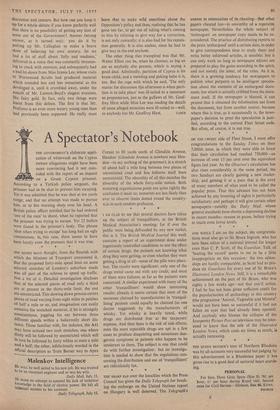THE SHARP RAP over the knuckles which the Press Council
has given the Daily Telegraph for break- ing the embargo on the United Nations report on Hungary is well deserved. The Telegraph's answer in extenuation of its cheating—that other papers cheated too—is unworthy of a reputable newspaper. Nevertheless the whole subject of `embargoes' on newspaper copy needs to be re- considered. The practice of distributing reports to the press 'embargoed' until a certain date, in order to give correspondents time to study them and write better informed articles, is sensible; but it can only work so long as newspaper editors are prepared to play the game according to the spirit, and not merely the letter, of the rules. As it is, there is a growing tendency for newspapers to publish what purports to be intelligent specula- tion about the contents of an embargoed docu- ment, but which is actually cribbed from the docu- ment itself. If the newspaper is blamed, it can protest that it obtained the information not from the document, but from another source; because where this is true, as it occasionally is, the news- paper's decision to print the speculation is justi- fied, according to the current Fleet Street code. But often, of course, it is not true.*














































 Previous page
Previous page